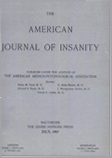PSYCHOSES AND ALLIED STATES OCCURRING SUBSEQUENT TO THYROIDECTOMY
Abstract
1. The histories of 70 thyroidectomized patients admitted to the Milwaukee Sanitarium in 16¼ years were studied. Clinical data regarding age, sex, residence, occupation, facts before and after thyroidectomy, including Sanitarium residence, are presented.
2. Their psychiatric disorders were chiefly of a functional nature (depression, elation, neurotic) in contrast to psychoses (delirious, exhaustive) usually seen in acute hyperthyroidism.
3. The evidence for acute postoperative delirious or exhaustion states was very slight in the group.
4. There were no cases of myxedema diagnosed by a consulting internist who examined all patients.
5. The prevalence of recurring attacks of psychiatric disorder before and after thyroidectomy makes the coincidence of toxic goiter and such states open to question. It is very probable that in some patients a psychiatric disorder was interpreted as the manifestations of toxic goiter.
6. It seems probable that thyroidectomy has been employed to treat recurring psychiatric disorders and with success because of its shock inducing effect.
7. Toxic goiter has been seen to develop in the course of a profound psychosis of a chronic nature and thyroidectomy was without effect on the psychosis.
8. Whether toxic goiter predisposes to degeneration of the nervous system, or to a deterioration in the functions of a person, is not known. Earlier senility and arteriosclerosis have been suspected.
9. In the study of these patients there seemed to be no positive evidence that emotional states cause hyperthyroidism.
10. The history of a patient who became psychotic and suicidal on the eve of thyroidectomy is presented with differential diagnosis. The patient recovered with electro-shock and psychotherapy during the course of which his supposedly elevated metabolic rate returned to normal.
Access content
To read the fulltext, please use one of the options below to sign in or purchase access.- Personal login
- Institutional Login
- Sign in via OpenAthens
- Register for access
-
Please login/register if you wish to pair your device and check access availability.
Not a subscriber?
PsychiatryOnline subscription options offer access to the DSM-5 library, books, journals, CME, and patient resources. This all-in-one virtual library provides psychiatrists and mental health professionals with key resources for diagnosis, treatment, research, and professional development.
Need more help? PsychiatryOnline Customer Service may be reached by emailing [email protected] or by calling 800-368-5777 (in the U.S.) or 703-907-7322 (outside the U.S.).



